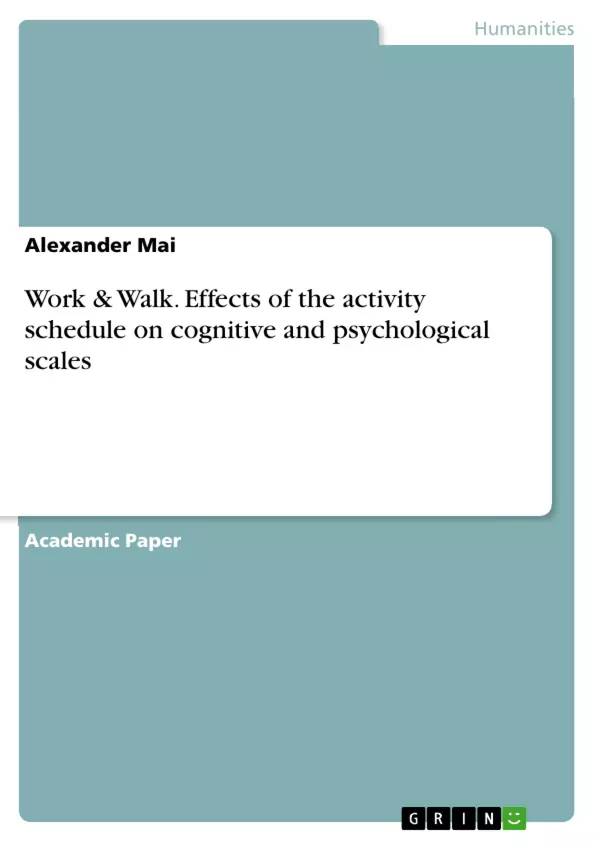In this paper, the question is asked whether the time of day of physical activity in the form of walking or otherwise during a typical workweek influences peoples responses to cognitive and psychological scales differently?
To get to the bottom of this question, an observational study was conducted with six participants (n = 6). The participants work full-time from Monday to Friday and were sent a questionnaire to their test smartphone at 8pm every day. The questionnaire contains different scales to measure three different dependent variables: well-being in the form of the MDMQ scale (Wilhelm and Schoebi 2007) - work engagement in the form of the UWES scale (Schaufeli et al. 2019) - attention vigilance in the form of the cognitive SART (Manly and Robertson 2005). It was found that subjective well-being increased significantly (.025) when participants were active at that day.
The rest of the paper is structured as follows. In part two, the theoretical foundations and literature on well-being and physical activity are presented. The hypothesis derived from the literature is stated and elaborated. In part three, the methodology underlying the study is explained in detail. In addition, the results of the well-being dimension are presented. In part four, the methodology of the study is discussed. Within part four, limitations of the study are presented and an outlook on possible future research areas is given.
Inhaltsverzeichnis (Table of Contents)
- Introduction
- Theoretical Foundations
- Subjective well-being
- Physical activity
- Relationship of physical activity and well-being
- Methods
- Results
- Discussion
Zielsetzung und Themenschwerpunkte (Objectives and Key Themes)
This study investigates the impact of physical activity timing, specifically during a typical workweek, on cognitive and psychological well-being. The research explores the relationship between physical activity, subjective well-being, and work engagement, aiming to determine whether the time of day for physical activity influences these outcomes.
- Relationship between physical activity and subjective well-being
- Influence of physical activity timing on cognitive and psychological scales
- Exploration of the impact of physical activity on work engagement
- Evaluation of the effects of different timeframes for physical activity (pre-work, during work, post-work)
- Analysis of the significance of physical activity on subjective well-being dimensions like valence, calmness, and energetic arousal.
Zusammenfassung der Kapitel (Chapter Summaries)
- Introduction: This chapter introduces the study's objective and rationale, highlighting the existing knowledge about the positive effects of physical activity on well-being and the gap in research regarding the timing of physical activity during a workweek. The study aims to fill this gap by examining the influence of physical activity timing on cognitive and psychological scales.
- Theoretical Foundations: This chapter provides a comprehensive overview of the theoretical framework underpinning the study. It delves into the concept of subjective well-being, its multifaceted dimensions, and its strong correlation with happiness. It also defines physical activity and its different categories, emphasizing the focus on physical activity during leisure time.
- Methods: This chapter details the methodology employed in the study. It describes the participant recruitment process, demographics, and data collection procedures. The chapter explains the questionnaires used to measure well-being, work engagement, and attention vigilance, highlighting the specific scales employed.
Schlüsselwörter (Keywords)
This research focuses on the impact of physical activity timing on cognitive and psychological well-being, specifically exploring subjective well-being, work engagement, and attention vigilance. Key concepts include physical activity during leisure time, well-being dimensions (valence, calmness, and energetic arousal), and the influence of different timeframes for physical activity (pre-work, during work, post-work).
- Quote paper
- Alexander Mai (Author), 2022, Work & Walk. Effects of the activity schedule on cognitive and psychological scales, Munich, GRIN Verlag, https://www.grin.com/document/1297686



